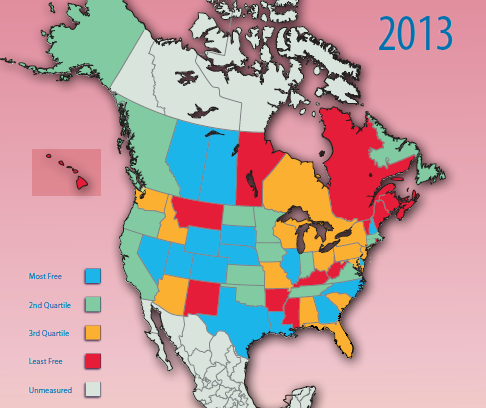Last week, the Fraser Institute published Economic Freedom of North America 2013 which illustrates the relative changes in economic freedom among US states and Canadian provinces:
Reason‘s J.D. Tuccille says of the report, “Canadian Provinces Suck Slightly Less Than U.S. States at Economic Freedom”:
For readers of Reason, Fraser’s definition of economic freedom is unlikely to be controversial. Fundamentally, the report says, “Individuals have economic freedom when (a) property they acquire without the use of force, fraud, or theft is protected from physical invasions by others and (b) they are free to use, exchange, or give their property as long as their actions do not violate the identical rights of others.”
The report includes two rankings of economic freedom — one just comparing state and provincial policies, and the other incorporating the effects of national legal systems and property rights protections. Since people are subject to all aspects of the environment in which they operate, and not just locally decided rules and regulations, it’s that “world-adjusted all-government” score that matters most, and it has a big effect — especially since “gaps have widened between the scores of Canada and the United States in these areas.” The result is is that:
[I]n the world-adjusted index the top two jurisdictions are Canadian, with Alberta in first place and Saskatchewan in second. In fact, four of the top seven jurisdictions are Canadian, with the province of Newfoundland & Labrador in sixth and British Columbia in seventh. Delaware, in third spot, is the highest ranked US state, followed by Texas and Nevada. Nonetheless, Canadian jurisdictions, Prince Edward Island and Nova Scotia, still land in the bottom two spots, just behind New Mexico at 58th and West Virginia at 57th.
Before you assume that the nice folks at Fraser are gloating, or that you should pack your bags for a northern relocation, the authors caution that things aren’t necessarily getting better north of the border. Instead, “their economic freedom is declining more slowly than in the US states.”




